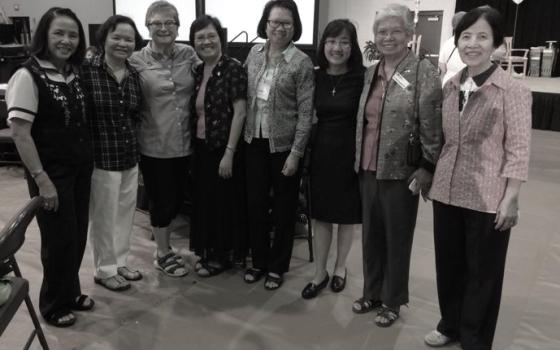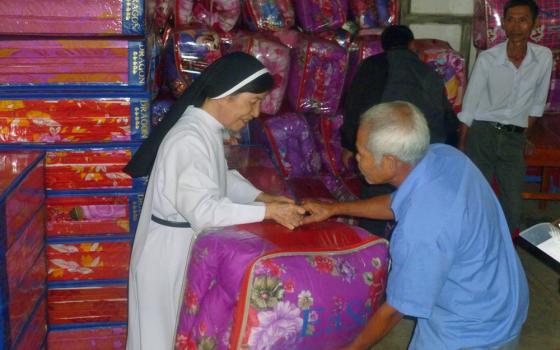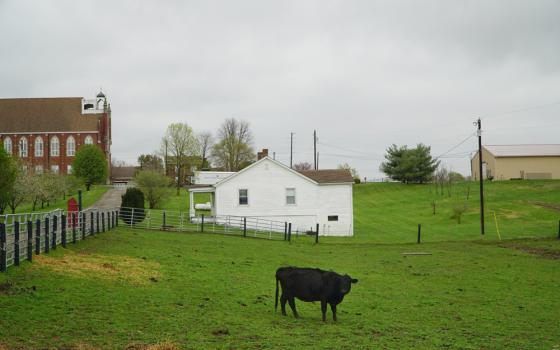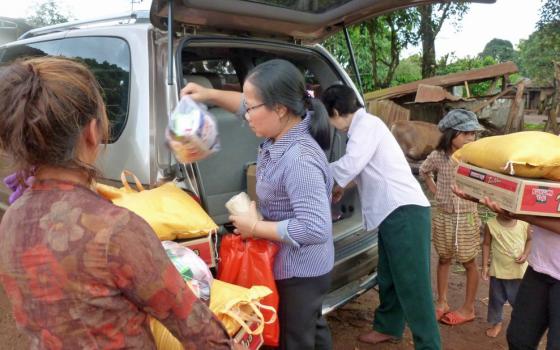In 1979, Sr. Tuyet Ngoc Tran began a perilous journey to the United States.
Four years earlier, communists had invaded the southern part of the country, confiscating sisters' schools in the area and leaving them without secure income. Communists burned villages, disfiguring and wounding children and adults. The sisters were forced to work in rice fields or raise animals to survive.
Sister Tuyet had taken temporary vows as a Dominican Sister of St. Rose of Lima in 1973, and with the approval of her superior, she joined a friend's family in planning to leave the country. However, dishonest guides took the family's money then reneged on the plan, forcing the group to remain in the country.
She decided to try again. A family hid her in a secret room with 25 others until it was safe to leave. The escapees, paralyzed with fear and exhaustion, trekked through dense forests and streams to a small fishing boat that transported them to a larger vessel anchored in the ocean.
Sister Tuyet's story is both unique and similar to others. Sisters from Vietnam are the largest group of international sisters in the United States, according to research from Sr. Mary Johnson of Trinity Washington University. Many fled the country after the communists invaded the south and congregational leaders suggested sisters return to their families or form small groups and live together in remote areas for safety.
Last summer, at a meeting of the Dominican Sisters of Peace, I met a number of Vietnamese sisters who were part of the 1975 migration. My curiosity was piqued as I learned that each found her way to the Kentucky Dominicans and later as a group to the Dominican Sisters of Peace.
Sister Tuyet, the first Vietnamese sister to make vows as a Kentucky Dominican in 1985, and Sr. Elaine DesRosiers, an American-born Dominican Sister of Peace, helped me unravel this complicated story of disruption, loss and new life.
The story begins in 1954, when the Geneva agreement divided the country, causing Catholics to flee to the south, fearing religious persecution. The Dominican Sisters of St. Catherine of Siena, founded in 1715, and diocesan groups of lay Dominican women also fled; the sisters settled in Tam Hiep. In 1956, the diocesan lay groups joined together to become sisters. They made vows in 1957 and in 1958 were established as a second congregation of Dominican Sisters of St. Catherine of Siena of Thanh Tam, Ho Nai, by Bishop Peter Hoa Nguyen Van Hien. Canonically, the women needed novitiate formation, so the Tam Hiep Dominicans welcomed and trained them. Each sister then returned to her separate diocesan group for vows.
In that same year, the bishop of Bùi Chu requested all novices who were from the North Bùi Chu Diocese and part of the new congregation to move to Tam Hiep, the original Dominican Sisters of St. Catherine of Siena congregation.
Sister Tuyet noted that the nearly 20 years between unification in 1956 and the migration were enormously confusing and painful for the sisters, made so by clerics' interference, sisters having little voice, and internal struggle among the groups within the two congregations.
In 1973, these struggles led three Thanh Tam, Ho Nai, diocesan groups to separate from the St. Catherine of Siena congregation to become the Dominican Sisters of St. Rose of Lima. Although separated, the two congregations stayed in touch with each other.
In the midst of the many disruptions of war and internal struggles, new recruits were still attracted to Dominican life. Bishop Peter Chi Ngoc Pham, founder of the Dominicans of St. Catherine of Siena Bùi Chu, sent one recruit, Huong, to the United States for university studies. Upon graduating, she entered the novitiate of the Kentucky Dominican Sisters of St. Catharine, taking the name Maria Rose. In 1960, she professed temporary vows by proxy as a member of the Vietnamese Dominican Sisters of St. Catherine of Siena and returned to Vietnam.
In 1974, Sr. Virginia Smith, a Kentucky Dominican, visited Vietnam and reconnected with Sister Maria Rose. Smith returned from her trip with stories of the brutality of life in Vietnam, and her community pledged to support Sister Maria Rose's community and accept as members any Vietnamese Dominicans who escaped to the United States.
It took Sister Tuyet months to reach the United States and years to reach the Kentucky Dominicans. Eighty-six people were crowded into her 29-by-9-foot escape boat in 1979, waiting for the captain and still-hopeful passengers on the shore. However, fearing exposure as communist jets flew overhead, the boat owner, who did not have piloting skills, decided to depart for Indonesia.
"He controlled our entire lives, including food: two bowls of rice, a bit of salt and two cups of water per day, if you had money or others shared their portions," Sister Tuyet said. "I shared my bit of rice with a child as I only wanted to stay alive."
Crowded into three rooms, passengers kept legs and arms folded inward; stretching out was impossible. Many suffered seasickness and nausea from the stench of urine and vomit.
During the nine days at sea, violent storms were frequent. Pirates searching for gold boarded the boat and emptied barrels of rice, oil and water, leaving the people hungry and thirsty. Fearing discovery, Sister Tuyet swallowed a gold ring, a gift from her late father, and hid under piles of fishing nets.
"We prayed most of the time," she said. "I felt I could trust God to save us, even with the disappointment of Russian and Chinese ships ignoring our distress signals."
Eventually, in the Malaysian sea, Americans on an oil rig gave them cereal, rice and water to keep them from starving. However, when the boat attempted to land in Indonesia, local sailors shot at them for hours until the boat owner and three children climbed on top of his cabin to wave a white flag. The sailors departed. The following morning, a fisherman offered to help them in return for gold, but settled for their fishing nets upon learning that pirates had stolen their gold.
Once they landed, food was also scarce.
"We ate sand snails and stolen coconuts, getting sick from both food and malaria," Sister Tuyet said. She sold the ring she had swallowed in exchange for two days of food for her companions.
For the next two weeks in their refugee camp, coping with homesickness and grief from losing family, religious community, friends and country, Sister Tuyet visited refugee families and taught the children religion. Aug. 8, 1979, was most painful: Her temporary vows as a Dominican Sister expired. Feeling completely abandoned by God, her weight dropped from 110 to 85 pounds.
When the group moved to another refugee camp with 2,000 people, rations were better: a monthly allotment for each person of 30 cups of rice, a bottle of fish sauce, salt, four cans of tuna and beans. However, water was scarce and bathroom facilities were primitive. Beds were available only for money, and using tree branches to lie on brought punishment. Stealing was rampant.
After five months, the United States accepted Sister Tuyet's application, and she flew to California. She spent five years raising a nephew and two nieces, during which she heard about the Kentucky Dominicans from Sr. Binh Thanh Nguyen, her novitiate companion. Sister Tuyet made vows with the Kentucky Dominicans in 1985 and Sister Binh transferred her vows in 1980, followed by other St. Rose of Lima members.
Sr. Nang Thi Nguyen, one of those transfers, is now a 50-year Jubilarian. She escaped Vietnam in 1980 after many attempts, hoping to join her brother in Missouri. She secured his address in her underwear, took a small bag of clothes, sugar, lemons and water and, with her niece and her two small nephews, reached an escape boat. The 155 passengers on her boat arrived in Singapore after a dangerous journey and lived in a refugee camp for six months. She and the family eventually flew to California and on to Lincoln, Nebraska. She later found and joined Sister Tuyet and Sister Binh in 1981.
Another transfer was Sr. Mary Phuc Nguyen. In 1980, while still in Vietnam, she received a letter from her sister in the United States, telling her to see the doctor, at the time a code for "escape." Her chance came so unexpectedly, she did not get to say goodbye to her father.
She and 10 others hid in a small fishing vessel before transferring to a larger one. Pirates hijacked the group two times in the Thai Sea, taking all their belongings and four women, who they later returned.
Life in the Thai refugee camps was also dangerous. Sister Mary was released from the camp upon receiving sponsorship. She flew to Houston to stay with Vietnamese Sisters of St. Catherine of Siena, later joining her companions in Kentucky in 1985.
Today, there are nine professed sisters of Vietnamese heritage and one novice with the Kentucky Dominicans.
Religious life is still strong in Vietnam, even though the communists restrict what sisters can do to preschools and kindergartens, dispensaries and social centers for indigenous mountain families. The irony is that many communist leaders send their children to the sisters' schools.
Sister Tuyet, a social worker, frequently returns to Vietnam to help Sr. Ha Ngoc Nguyen, a St. Rose of Lima Dominican and medical doctor, offer assistance to people affected by leprosy and other diseases. When she can get donations, Sister Tuyet also buys blankets to distribute to families in the mountains.
My journey of curiosity to learn the story about these nine Vietnamese Dominicans of Kentucky has been breathtaking and inspiring. I am awed at the sisters' endurance. The many complications of war, religion and politics that propelled them to escape, leaving behind family, community and country, took much courage, ingenuity and resilience. These qualities, no doubt, helped them navigate all the adjustments to a new country and re-finding a religious life precious to them. The power of their vocation is strong, great gift to their new lives as Dominican Sisters of Peace.
*An earlier version of this caption incorrectly identified Fitzgerald.
[Joyce Meyer is a member of the Sisters of the Presentation of the Blessed Virgin Mary and is GSR's liaison to women religious outside of the United States.]





